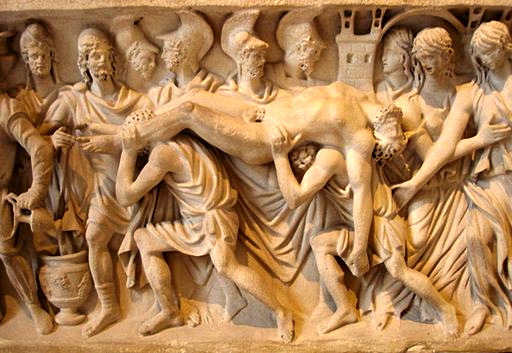War brings out the best and the worst in people. Or maybe it just brings out the worst, in many different shapes.
In the Ilias, Hector takes his leave from Andromache and their baby. If he doesn’t survive the war, his small son will be killed and his wife will become a slave.“So speaking glorious Hector reached out to his child.
But the baby shrank back to the breast of his well-belted nurse
crying, panicking at the sight of his own father
frightened at both the bronze and the helmet with its crest of horse-hair,
thinking it was nodding dreadfully down from the crest of his helmet.
His dear father and mother laughed aloud.
Straightaway glorious Hector removed the helmet from his head
and laid it down, all shining, on the ground.
Then he kissed his beloved son and rocked him in his arms.
He spoke, praying to Zeus and the other gods:
“Zeus and the other gods, grant that this child of mine
may become, as I am, pre-eminent among the Trojans,
this powerful in strength, and rule over Ilion in strength.
And let someone say one day, “This fellow is much better than his father
when he returns from fighting. Let him kill an enemy,
bring back the bloody armour and delight the heart of his mother.””
(Iiad, book VI)
Later, Hector is killed by Achilles, who triumphantly drags his dead body around the walls of Troy. Hector’s father is prepared to kiss Achilles’ hand just to be allowed to bury him. This is war, some 3000 years ago.
But surely today, war could also mean restoring law and order by dropping a few sophisticated bombs? No, it couldn’t. Our recent experiences in Somalia and Iraq show that this type of war will not lead to stability and democracy. War hasn’t really changed since ancient times. It still means atrocities on all sides, combined with huge doses of propaganda and misinformation. War means making horrible decisions.
In 480 BCE the Persians invaded Greece for the second time in a decade. After they ravaged the Acropolis in Athens King Xerxes and the Persians with their supporters met the Greeks for a showdown in a sea battle, in the narrow straits between the island of Salamis and the western coast of mainland Greece.
Bonnie MacLachlan, “Women in Ancient Greece, A sourcebook”, Bloomsbury
Queen Artemisia of Caria was a subject ally of Xerxes. When he asked his military leaders for advice, she spoke out against it:
“I am telling you this – spare your ships and make no battle at sea! For their men are as much stronger than yours at sea as men are stronger than women. Why should you put yourself at risk on all fronts in a naval battle? Don’t you have control of Athens for the sake of which you set out this campaign? And don’t you control the rest of Greece?”
Against all expectations, Xerxes did not have Artemisia killed for being disinclined to engage in battle. But he did decide to fight at sea and Artemisia found herself commanding a ship and being pursued by the Greeks, without room to manoeuvre because her way out was blocked by a Calyndian ship, fighting for Xerxes.
Artemisia did the only thing she could do to save her life: she rammed and sunk the friendly ship. The captain of the pursuing Attic trireme supposed that Artemisia was a Persian deserter fighting on the Greek side. He turned away. There were no survivors on the Calyndian ship to accuse her and Xerxes was so proud of her sinking what he thought was an enemy ship that he said:“My men have become women, and the woman men!” (Herodotus, Histories 8.88 14-15)
Like Xerxes, I think war can change people profoundly. Maybe it’s wrong that we’ve now got professional armies, that we can bomb the enemy from navy vessels or from the air, guided by politicians who do not expect their wives to be violated and their children killed. But we shouldn’t forget that the percentage of civilians ending up dead has risen steeply since ancient times. And that the sorrows of war will last for generations.
The stories of Andromache and Artemisia were found in “Women in Ancient Greece, A sourcebook”, by Bonnie MacLachlan.
![Construction and destruction of Troy, by Maître d'Orose [Public domain]](https://pipteinpteron.files.wordpress.com/2013/09/construction_et_destruction_de_troie_-_mac3aetre_dorose_-_philama_ms-1945-65-1_f-66v.jpg?w=630)

![Tomb of Xerxes, Iran, by Roodiparse (Own work) [Public domain]](https://pipteinpteron.files.wordpress.com/2013/09/512px-tomb_of_xerxes.jpg?w=630)
![Two women at a window, by Murillo c.1655-1660 [public domain]](https://pipteinpteron.files.wordpress.com/2013/08/two_women_at_a_window_c1655-1660_murillo.jpg?w=240&h=300)

![After the snowfall, by Cordelia Wilson (1876-1953) [Public domain]](https://pipteinpteron.files.wordpress.com/2013/08/cordelia_wilson_-_after_the_snowfall.jpg?w=300&h=246)
![An out-of-doors study, by John Singer Sargent [public domain]](https://pipteinpteron.files.wordpress.com/2013/08/brooklyn_museum_-_an_out-of-doors_study_-_john_singer_sargent_-_overall.jpg?w=630)
![Meditation by the Sea, Unknown artist ca 1860 [public domain]](https://pipteinpteron.files.wordpress.com/2013/08/meditation_by_the_sea.jpg?w=300&h=209)

![Boats on a lake, by Hiroshige [Public domain]](https://pipteinpteron.files.wordpress.com/2013/07/hiroshige_boats_on_a_lake.jpg?w=630)
![Prometheus carrying fire, by Jan Cossiers [public domain]](https://pipteinpteron.files.wordpress.com/2013/07/jan_cossiers_-_prometheus_carrying_fire.jpg?w=193&h=300)
![Pandora, by Alexandre Cabanel [public domain] CC 3.0 license](https://pipteinpteron.files.wordpress.com/2013/07/alexandre_cabanel_-_pandora_-_walters_3799.jpg?w=630)
![La Rochefoulcauld, Inner Court, by Thierry de Villepin [CC-BY-SA-3.0 (http://creativecommons.org/licenses/by-sa/3.0)]](https://pipteinpteron.files.wordpress.com/2013/07/la_rochefoucauld_cour_intc3a9rieure.jpg?w=300&h=194)
![Cameo, by Bellezzedinapoli [CC-BY-SA-3.0 (http://creativecommons.org/licenses/by-sa/3.0)]](https://pipteinpteron.files.wordpress.com/2013/07/cameo_of_sardinian_conch_ascione_e_antonio_mennella_1925_museo_ascione.jpg?w=242&h=300)
![La Rochefoucauld, salon, by Thierry de Villepin [CC-BY-SA-3.0 (http://creativecommons.org/licenses/by-sa/3.0)]](https://pipteinpteron.files.wordpress.com/2013/07/la_rochefoucauld_-_salon.jpg?w=300&h=199)
![Oeil, by Guylaine Brunet (posted to Flickr) [CC-BY-2.0 (http://creativecommons.org/licenses/by/2.0)]](https://pipteinpteron.files.wordpress.com/2013/07/512px-cats_eye.jpg?w=630)
![Manuscrito_de_Petrarca.jpg: Manu Matthaei [Public domain]](https://pipteinpteron.files.wordpress.com/2013/07/retrato_de_petrarca.jpg?w=630&h=566)
![Mirrored, by aussiegall from sydney, Australia (Uploaded by russavia) [CC-BY-2.0 (http://cc.org/licenses/by/2.0)]](https://pipteinpteron.files.wordpress.com/2013/06/mirrored_691557593.jpg?w=630)